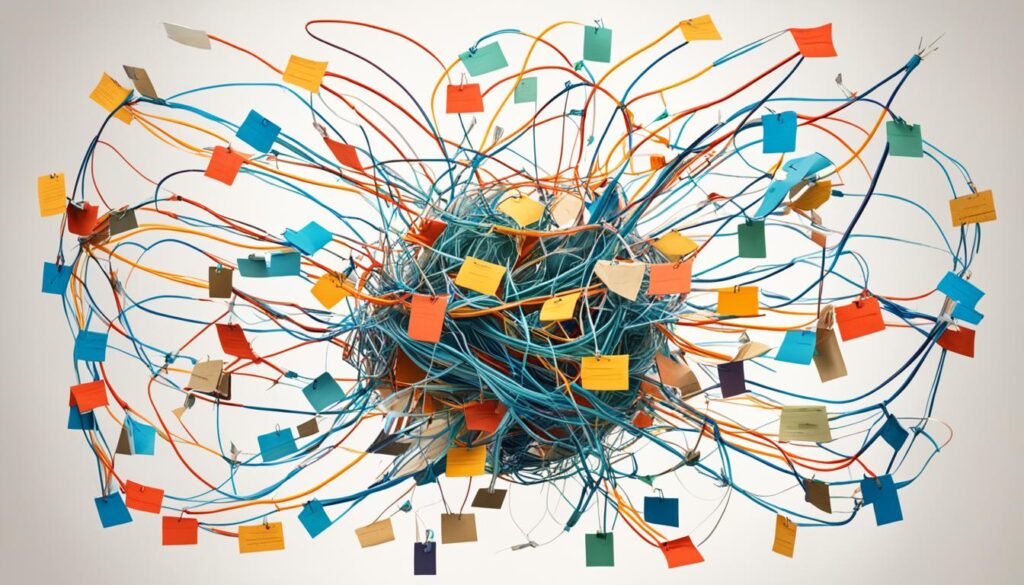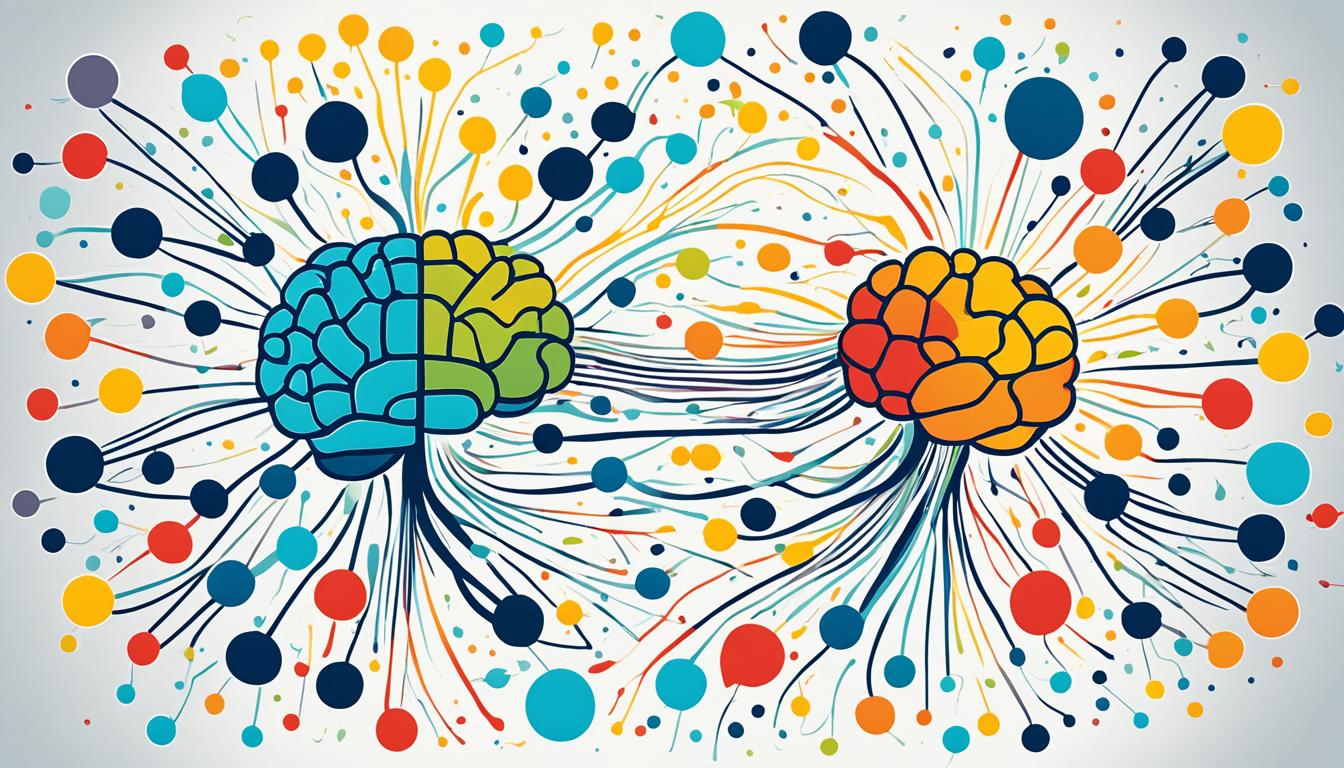Did you know that aphantasia, the inability to form mental images, affects up to 2% of the population? Similarly, Attention Deficit Hyperactivity Disorder (ADHD) is a condition that affects about 8-10% of children and 2-5% of adults worldwide. But what if there was a connection between these two seemingly unrelated conditions? Let’s explore the insights of Aphantasia ADHD connection.
In this article, we will explore the intriguing relationship between aphantasia and ADHD. We will investigate any potential links, shared characteristics, and the impact that both conditions can have on daily life. Additionally, we will provide insights and practical tips for individuals living with both aphantasia and ADHD, offering strategies to cope with their unique cognitive profiles.
Understanding Aphantasia and Its Impact on Individuals
In this section, we will delve deeper into the concept of aphantasia. We will provide a detailed definition of aphantasia and discuss its cognitive characteristics, including the impact on memory, imagination, and perception. Additionally, we will explore how aphantasia influences daily life and cognitive tasks, such as problem-solving and creativity. Lastly, we will examine the relationship between aphantasia and dreaming, considering whether individuals with aphantasia can still experience visual imagery during dreams.
Defining Aphantasia and Its Cognitive Characteristics
Aphantasia is a condition characterized by the inability to form mental images. It affects an individual’s ability to visualize people, objects, or memories in their mind’s eye. Those with aphantasia may struggle to conjure up mental pictures and rely more heavily on other senses.
Cognitive characteristics of aphantasia include:
- Difficulty visualizing or imagining scenes, faces, or objects
- Lack of visual memory recall
- Reliance on verbal or conceptual thinking
Individuals with aphantasia often have vivid experiences in other sensory modalities, such as auditory or emotional sensations.
How Aphantasia Influences Daily Life and Cognitive Tasks
Aphantasia can have a significant impact on various aspects of daily life and cognitive tasks. Individuals with aphantasia may face challenges in:
- Recalling visual details of past events or experiences
- Creating mental images to aid in problem-solving or planning
- Engaging in creative activities that heavily rely on visualization
- Forming visual associations with new information
Despite these challenges, individuals with aphantasia often develop compensatory strategies and learn to rely on other cognitive processes to navigate the world.
The Relationship Between Aphantasia and Dreaming
One intriguing aspect of aphantasia is its potential impact on dreaming. While individuals with aphantasia have difficulty visualizing their waking state, it remains uncertain whether they experience visual imagery during dreams. Some anecdotal reports suggest that individuals with aphantasia can indeed experience visual elements in their dreams, while others describe dreams that are more conceptual or sensory.
Exploring the ADHD Experience: Symptoms and Challenges
In this section, we aim to provide a comprehensive understanding of the experience of individuals living with ADHD. ADHD, or Attention Deficit Hyperactivity Disorder, is a neurodevelopmental condition that affects both children and adults. It is characterized by symptoms such as inattention, hyperactivity, and impulsivity.
ADHD Symptoms:
- Inattention: Difficulty focusing on tasks, being easily distracted, and frequently making careless mistakes
- Hyperactivity: Excessive restlessness, constant movement, and difficulty engaging in quiet activities
- Impulsivity: Acting without thinking, interrupting others, and having difficulty waiting for turns
Living with ADHD poses unique challenges that can impact various aspects of daily life. These challenges can include:
- Difficulty focusing and staying on task
- Impulsivity, leading to impulsive decision-making and potential social challenges
- Organizational difficulties, such as keeping track of time and belongings

It is important to note that the severity and presentation of ADHD symptoms can vary from person to person. Some individuals may primarily experience symptoms of inattention, while others may struggle more with hyperactivity and impulsivity. The challenges posed by ADHD can impact both personal and professional life, requiring individuals to develop coping strategies and seek support.
Aphantasia ADHD: Investigating the Connection
This section delves into the research and scientific studies investigating the connection between aphantasia and ADHD. By examining the existing research and its findings, we can gain further insights into the potential relationship between these two conditions and understand how they may interact.
Research exploring the link between aphantasia and ADHD is crucial for understanding the cognitive profile of individuals with both conditions. Investigating the connection can provide valuable information on shared characteristics, potential underlying mechanisms, and how these conditions may impact each other.
While aphantasia and ADHD are separate conditions with distinct characteristics, there may be overlapping features that warrant closer investigation. By analyzing empirical evidence, we can begin to unravel the complex relationship between aphantasia and ADHD, shedding light on their co-occurrence and potential underlying factors.
Understanding the connection between aphantasia and ADHD can have far-reaching implications for clinical practice, interventions, and treatment approaches. It can inform the development of tailored strategies and interventions that address the specific needs of individuals with both conditions, ultimately enhancing their quality of life.
Let’s explore the current state of research on the connection between aphantasia and ADHD and delve into the findings that contribute to our understanding of how these two conditions interact.

Living with Aphantasia and ADHD: Coping Strategies and Tips
Managing the unique challenges of living with both aphantasia and ADHD requires adopting coping strategies and implementing practical tips to enhance daily life. In this section, we will explore techniques that can help individuals navigate their cognitive profile effectively.
Developing Non-Visual Memory Strategies
Since individuals with aphantasia are unable to form mental images, developing non-visual memory strategies can be beneficial. Consider utilizing the following techniques:
- Utilize verbal cues: Associate information with spoken words or phrases to enhance recall.
- Create associations: Connect new information with existing knowledge or personal experiences to improve memory retrieval.
- Use mnemonic devices: Employ memory aids such as acronyms, rhymes, or visualizations to facilitate information retention.
Implementing these non-visual memory strategies can compensate for the inability to rely on mental imagery.
Enhancing Focus and Attention Without Mental Imagery
Individuals with aphantasia often struggle with focus and attention due to the absence of mental imagery. However, several techniques can help mitigate these challenges:
- Utilize external reminders: Make use of calendars, planners, or digital apps to stay organized and manage tasks effectively.
- Break tasks into smaller steps: Dividing larger tasks into manageable chunks can improve focus and prevent overwhelm.
- Practice mindfulness techniques: Engage in activities such as meditation or deep breathing to improve overall attention and reduce distractions.
By implementing these strategies, individuals with aphantasia can enhance their focus and attention without relying on mental imagery.
Leveraging Intuition: A Key Skill for Those with Aphantasia ADHD
While individuals with aphantasia lack the ability to visualize, their intuition can serve as a valuable asset in managing daily life and tasks. Here are some ways to leverage intuition:
- Trust your instincts: Pay attention to your gut feelings and make decisions based on your intuition.
- Embrace creativity: Explore alternative problem-solving methods that rely on intuition and divergent thinking.
- Practice self-reflection: Take time to connect with your inner self and listen to your intuition’s guidance.
By recognizing the power of intuition, individuals with aphantasia and ADHD can tap into this skill to navigate their cognitive challenges effectively.

The image above represents the journey of individuals living with aphantasia and ADHD, showcasing the resilience and strength required to thrive in spite of their unique cognitive profile.
Conclusion
In conclusion, our exploration of the connection between aphantasia and ADHD has shed light on the intersection of these two conditions. Aphantasia, characterized by the inability to form mental images, and ADHD, a neurodevelopmental disorder affecting attention and impulsivity, may have overlapping characteristics and challenges.
Throughout this article, we have learned about the cognitive characteristics of aphantasia and its impact on daily life and cognitive tasks. We have also explored the symptoms and challenges of ADHD, gaining a better understanding of the experiences of individuals with this condition.
Additionally, we have investigated the research and scientific studies on the connection between aphantasia and ADHD, highlighting the need for further exploration in this area. While the link between these two conditions is not yet fully understood, the insights gained can inform strategies and coping mechanisms for individuals living with both aphantasia and ADHD.
For those navigating the unique cognitive profile of aphantasia and ADHD, developing non-visual memory strategies, enhancing focus and attention through alternative means, and leveraging intuition can be valuable tools. By utilizing these techniques, individuals can mitigate the challenges posed by aphantasia and ADHD and optimize their cognitive functioning.
FAQ
Is there a connection between aphantasia and ADHD?
While there is no direct causal relationship established, some research suggests a potential link between aphantasia and ADHD. Both conditions involve cognitive differences that affect perception, memory, and attention.
Do people with ADHD have trouble visualizing?
ADHD primarily affects attention and executive functioning rather than visualization itself. However, individuals with ADHD may experience difficulties in forming and maintaining mental images due to their challenges with sustained focus and working memory.
Is aphantasia linked to other disorders?
Aphantasia has been associated with various neurodivergent conditions, including autism and ADHD. While the exact nature of these relationships is still being explored, there seems to be some overlapping cognitive characteristics.
What causes people to have aphantasia?
The exact cause of aphantasia is not yet fully understood. Some research suggests a potential genetic component, while others propose that it may be related to differences in brain structure or connectivity. Further studies are needed to provide a definitive answer.
Is aphantasia linked to anxiety?
There is limited research on the specific relationship between aphantasia and anxiety. However, anecdotal evidence suggests that individuals with aphantasia may experience anxiety related to their inability to form mental images, particularly in social and creative contexts.
Can individuals with aphantasia still experience visual imagery during dreams?
The ability to visualize during dreams, known as “lucid dreaming,” can vary among individuals with aphantasia. While some may report limited or no visual imagery during dreams, others may experience vivid dreams without relying on mental visualization.
What are the common symptoms of ADHD?
Common symptoms of ADHD include inattention, hyperactivity, and impulsivity. Individuals with ADHD may struggle with maintaining focus, organizing tasks, managing time, and controlling impulsive behavior.
How does ADHD impact daily life?
ADHD can significantly impact various aspects of daily life, including academics, work performance, and relationships. Difficulties with attention and self-regulation can make it challenging to complete tasks, follow instructions, and stay organized.
What research has explored the connection between aphantasia and ADHD?
While research investigating the connection between aphantasia and ADHD is still limited, some studies have highlighted potential similarities in cognitive processes and neural characteristics between individuals with aphantasia and those with ADHD. However, more research is needed to establish a definitive link.
Are there coping strategies for individuals with aphantasia and ADHD?
Yes, individuals with both aphantasia and ADHD can employ various coping strategies to manage their unique cognitive profile. Strategies may include developing non-visual memory techniques, enhancing focus and attention through alternative methods, and leveraging intuition as a valuable cognitive resource.




